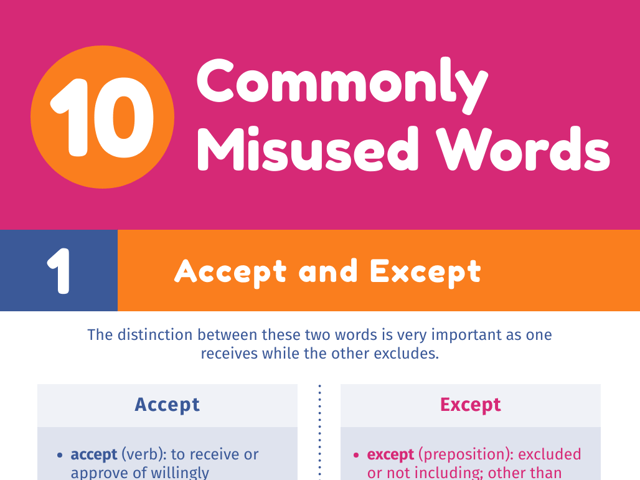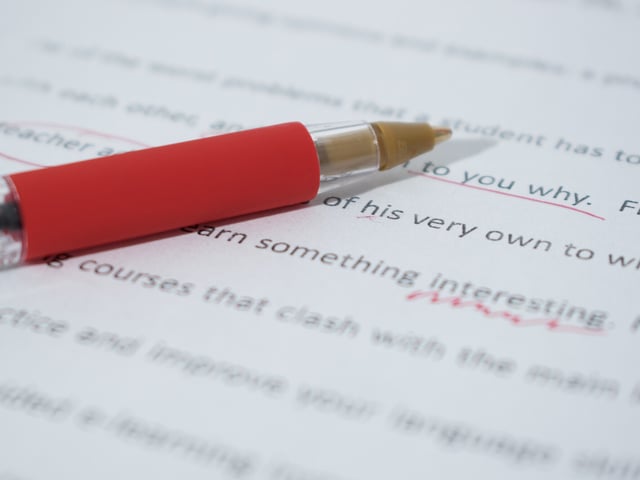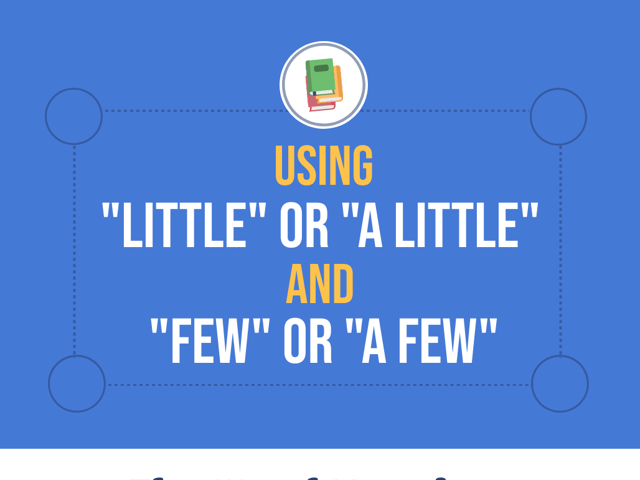
10 Commonly Misused Words
English is hard. There are rules for everything and, as numerous as the rules are, there are also exceptions to the rules. This means that spelling or grammatical usage can change without warning. Ugh. So what’s a learner to do? Well, you shouldn’t throw all the rules out the window and let chaos ensue. But you should realize that there will be exceptions to those rules you’ve learned and knowing the most common exceptions will help you avoid mistakes and misuse.
Although it is certainly not an exhaustive list, below are 10 commonly misused words you’ll want to make sure to use correctly. We’ve given you the dictionary definition and a brief explanation, plus some hints and examples of correct usage.
While lists of commonly misused words vary from source to source, the 10 we’ve selected appear regularly as misused words that teachers, linguists, editors, and business professionals complain about seeing in people’s writing. Misusing these words in particular will red-flag your writing and potentially change your intended message. So, be the exception to the masses and understand how to correctly use the following words.
1. Accept and Except
accept (verb): to receive or approve of willingly
except (preposition): excluded or not including; other than
The distinction between these two words is very important as one receives while the other excludes.
He refused to accept her apology for breaking his phone when they had a fight.
Everyone ordered the chicken entrée except for Lana as she is a vegan; she had the pasta.
2. Advice and Advise
advice (noun): guidance or counseling to give direction about future action
advise (verb): to offer guidance or suggestions to someone
This word should be selected based on how it’s used: as a noun or as a verb.
She did not take the doctor’s advice to rest her ankle and ended up spraining it again.
The doctor advised the patient to rest, apply ice, and elevate her sore ankle.
3. Affect and Effect
affect (verb): to influence, change, or have an effect on
effect (noun): the consequence or outcome of an action or event
Notice that the definition for the verb affect uses the noun effect. To help you remember which is the thing (noun) and which is the action (verb), consider the first letter of the word. Inverted, a capital A can look somewhat like a V for verb; affect is the verb form. The e at the beginning of effect might have you think of the ending—how are things going to work out? What’s going to be the outcome? Technically, effect can be used as a verb (as in, to cause to happen. For instance: “How will you effect these changes in the business model?”) but most of the time it is used as a noun.
Undoubtedly, COVID-19 shutdowns have affected people worldwide.
No one can say at this point what the long-term effects of the global shutdown will be.
4. e.g. and i.e.
e.g.: “exempli gratia” (Latin) roughly translates to “for example”
i.e.: “id est” (Latin) roughly translates to “in other words”
These Latin abbreviations are often used interchangeably to note an example, but they actually have distinct meaning when you know what they stand for and should not be used synonymously. To remember when to use each, consider the first letter. To indicate an example of what is being discussed, use e.g (e for example). To indicate a rewording for clarification, think i for in other words and use i.e. Just make sure that no matter which one you use, you include the periods after each letter as these are abbreviations of Latin phrases. (There is some debate on whether to follow these abbreviations with a comma, but most style guides recommend it, as we do here.)
In college you get to choose from a variety of classes within the same discipline, e.g., British Literature to 1800, American Literature to Whitman, The English Language in America, Shakespeare, and The American Frontier in Literature.
When selecting the menu for her reception, Zara had many delicious options to choose from, e.g., cedar-plank roasted salmon, rosemary braised lamb shank, and chicken scaloppine.
The class grade was curved to the highest score, i.e., 76%.
5. Farther and Further
farther (adj or adv): at a greater distance or to a greater extent
further (verb, adj, or adv): extending beyond or additional
The general rule of thumb is that farther indicates physical distance (think far distances) and further suggests a figurative distance. However, as we mentioned at the beginning, this is one of those situations where exceptions exist. Some overlap does exist in the use of these words and because they can both be used as adjectives and adverbs, it can be hard to know which one to use (further can also be used as a verb). There’s an auto parts company that recently introduced a new slogan, “We go further to help you go farther.” This may help you distinguish that farther suggests distance while extending oneself to be helpful is going further.
“How much farther do we have to drive?” the children whined from the back seat.
If your account is hacked and you don’t change your password, you could open yourself up to further fraud opportunities by hackers.
I want to further my education by attending graduate school.
6. Its and It’s
its: the possessive form of the pronoun it
it’s: a contraction of it is or it has
Commonly misused, the easiest way to remember which is the right one to use in your writing is to substitute “it is” or “it has” where you plan to use its. If the phrase “it is” or “it has” doesn’t fit in the context of the sentence, chances are you need to use its and not it’s. This is one of those exceptions to a common grammar rule since usually an ’s indicates possession. It doesn’t in the case of it.
The dog sniffed its bowl to make sure it didn’t miss any food.
The weather forecaster says it’s supposed to rain tomorrow.
7. Lay and Lie (versions of the verb)
lay (verb): to put or set down; deposit
lie (verb): to rest or recline; to be in a flat or reclined position
To remember when to use lay and lie, you must determine if there is a direct object to the verb in the sentence (the direct object is the person or thing that receives the action of the verb). If so, use lay. Another trick: I have to “lie” down when I’m tired. So if you’re referring to someone or something “reclining” to rest, use lie.
The bride wants to lay her gown over the bed so it won’t get wrinkled.
He was so comfortable lying under the shade of the tree, Sharhad thought he could lie there all day.
8. Then and Than
then (adv): indicative of a point in time; at that time
than (conjunction; preposition): introduces a comparison between two things
One way to distinguish which is the correct usage is to consider the spelling. “Then” has an e, which is how “time” ends. “Than” has an a, which is found in “comparison”.
Stan poured his coffee and then sat down to read the newspaper.
Stan would rather drink coffee than drink tea.
9. Who and Whom
who (pronoun): identifies what or which person or people (the subject); may introduce a clause providing more information about a specific noun previously named
whom (pronoun): used in a sentence as the object of a preposition or verb
When trying to determine whether to use who or whom, try some substitutions in the sentence to see what sounds right. If “he” or “she” can be used in the sentence (or would be used to ask a question the sentence would answer), the pronoun to select is who. If the sentence sounds better with him or her, then the correct selection is likely whom (tip: “him” and “whom”). It’s because the pronoun is referring to the object of a verb or preposition in that case.
Mollie likes helping customers who know what they’re looking for and don’t waste her time.
As he looked out at the crowd, Sam saw many people whom he recognized from the company.
10. Your and You’re
your (determiner): belonging to, associated with, or possessed by a specific person being addressed
you’re: a contraction of you are
When addressing someone directly, the second person possessive adjective your should be used. It’s always followed by a noun. You’re is a contraction, as indicated by that apostrophe. So, if substituting you are in the sentence doesn’t make sense, you’ll need to use your.
Did you lose your notes?
I see you’re well prepared for today’s exam.
Bonus Tricksters
As we mentioned, the list of commonly misused words is long and we can’t cover them all here. However, some other commonly mistaken words include the three theres and the three tos, so here’s a quick rundown of those.
There, Their, and They’re
there: indicates location
their: determiner showing possession
they’re: a contraction of they are
To remember which one is which, remember that here and there show where something happens (see all those heres?). They’re is a contraction because of the apostrophe replacing the missing letter, and their indicates possession. If you wonder about using they’re, try substituting they are and see if it still makes sense. If not, it’s one of the other two spellings of the word.
After the kids left the family home for college, Mr. and Mrs. Reeves decided they couldn’t live there anymore.
They loaded all of their furniture into the moving truck this morning.
They’re going to buy a new house in Atlanta.
To, Too, and Two
to (preposition): indicates movement, action, purpose, or end result
too (adv): also, in addition, besides; to a higher degree than is desired or feasible
two (adj): being the second; one more than one
To is often used to help indicate the action of a verb; too has an extra o that wants to tag along also; two is a number.
We drove twenty miles to the nearest gas station before heading to the airport to pick up Aunt Rosa.
When I told five of my friends I was going camping for the weekend, they wanted to come too, but I told them it would be too many people for my small tent.
Joe and Phoebe picked up two sandwiches and two bags of chips for lunch.
We know this is a lot to remember along with all of the other stuff going on in your world. But as you practice using these words correctly, proper use will soon come naturally and you’ll be the one to spot errors in writing. To get started, try either printing this list out for reference or bookmarking this page on your device. Pretty soon, you won’t even have to look at it!

Keep Reading

English Basics Blog
How to Write a Compare and Contrast Essay
When you were in school, you probably had to write a lot of different t…

English Basics Blog
What are Superlatives?
We spend our lives making comparisons, whether we realize it or not. Wh…

English Basics Blog
When to Use “Little” or “a Little” and “Few” or “a Few”
Few aspects of the English language can grow as convoluted as when to u…